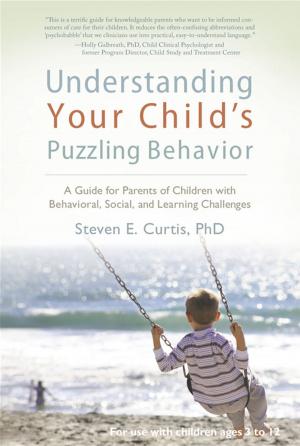The Syndrome Y Solution
Emotional Strength Building For Your Underperforming, Unmotivated, Underacheiving Son
Nonfiction, Family & Relationships, Parenting, Child Care| Author: | Karen Chesnutt | ISBN: | 9781680610055 |
| Publisher: | Librastream | Publication: | February 28, 2017 |
| Imprint: | Librastream | Language: | English |
| Author: | Karen Chesnutt |
| ISBN: | 9781680610055 |
| Publisher: | Librastream |
| Publication: | February 28, 2017 |
| Imprint: | Librastream |
| Language: | English |
If your son is having problems in school and disrupting family life at home and you can’t find a reason, this book offers proven help. Many bright and able boys are paralyzed by a puzzling set of symptoms characterized by problems at home, school, and in every-day life. But most of these boys, when tested, are found not to have any disorder that would explain their problems. Every parent worried about an underperforming son should read this book. It tells the story of how a psychologist saw a distinctive pattern in many boys brought to her for testing because of problems at home and at school. Dr. Karen Chesnutt has identified a set of symptoms that she calls Syndrome Y. More important, she has devised a program of treatment that actually works. Building emotional strength is the key to overcoming underperformance, low motivation, and under-achievement. Problems resembling Syndrome Y have been described in the past. Some data-driven and research-based books have hinted at Syndrome Y, but this is the first book to offer an effective way to deal with it. Dr. Chesnutt’s five-phase program is experience-based and practical. Her program is the first to deal with the “why” of Syndrome Y and to treat its underlying causes. Her approach is based on many years of experience as a parent, teacher, and psychologist. According to Dr.Chesnutt, “This book is written for parents whose sons are unmotivated, underachieving, and dependent. They are often bright, engaging youngsters, but chronic underachievers. They have little internal motivation. They seem unaffected by traditional motivators such as reward, punishment, praise, or scorn. They are not motivated by grades. They are willing to depend on others to set the agenda for their lives, and are willing to let others complete tasks that are really their responsibility. These boys usually test as capable in academic ability, but they seem satisfied with minimal or failing results.” "The five main characteristics of Syndrome Y have something in common. They all indicate that something is missing. That missing element is what I call emotional strength. It is not a lack of skill or knowledge. It is not a lack of opportunity. It is not merely a lack of motivation. The important thing to realize is that the problem is emotional. Syndrome Y boys do not have emotional strength," Dr. Chesnutt says. “In order for your son to begin to function independently, to be motivated, to have passion for something, he needs to build his emotional strength,” Dr. Chesnutt says. "Emotional strength is not something that can be learned or a skill that can be acquired. It is more like a muscle that needs to be exercised. It takes time and repetition to increase emotional strength. Many parents have asked me if emotional strength can be increased. The answer is yes, it can, with enough patience, practice, and exercise,” reports Dr. Chesnutt “Just as we think about the development of physical strength, development of emotional strength requires exercise, practice, and challenge,” Dr. Chesnutt says.
If your son is having problems in school and disrupting family life at home and you can’t find a reason, this book offers proven help. Many bright and able boys are paralyzed by a puzzling set of symptoms characterized by problems at home, school, and in every-day life. But most of these boys, when tested, are found not to have any disorder that would explain their problems. Every parent worried about an underperforming son should read this book. It tells the story of how a psychologist saw a distinctive pattern in many boys brought to her for testing because of problems at home and at school. Dr. Karen Chesnutt has identified a set of symptoms that she calls Syndrome Y. More important, she has devised a program of treatment that actually works. Building emotional strength is the key to overcoming underperformance, low motivation, and under-achievement. Problems resembling Syndrome Y have been described in the past. Some data-driven and research-based books have hinted at Syndrome Y, but this is the first book to offer an effective way to deal with it. Dr. Chesnutt’s five-phase program is experience-based and practical. Her program is the first to deal with the “why” of Syndrome Y and to treat its underlying causes. Her approach is based on many years of experience as a parent, teacher, and psychologist. According to Dr.Chesnutt, “This book is written for parents whose sons are unmotivated, underachieving, and dependent. They are often bright, engaging youngsters, but chronic underachievers. They have little internal motivation. They seem unaffected by traditional motivators such as reward, punishment, praise, or scorn. They are not motivated by grades. They are willing to depend on others to set the agenda for their lives, and are willing to let others complete tasks that are really their responsibility. These boys usually test as capable in academic ability, but they seem satisfied with minimal or failing results.” "The five main characteristics of Syndrome Y have something in common. They all indicate that something is missing. That missing element is what I call emotional strength. It is not a lack of skill or knowledge. It is not a lack of opportunity. It is not merely a lack of motivation. The important thing to realize is that the problem is emotional. Syndrome Y boys do not have emotional strength," Dr. Chesnutt says. “In order for your son to begin to function independently, to be motivated, to have passion for something, he needs to build his emotional strength,” Dr. Chesnutt says. "Emotional strength is not something that can be learned or a skill that can be acquired. It is more like a muscle that needs to be exercised. It takes time and repetition to increase emotional strength. Many parents have asked me if emotional strength can be increased. The answer is yes, it can, with enough patience, practice, and exercise,” reports Dr. Chesnutt “Just as we think about the development of physical strength, development of emotional strength requires exercise, practice, and challenge,” Dr. Chesnutt says.















